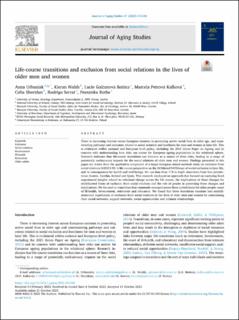Life-course transitions and exclusion from social relations in the lives of older men and women
Urbaniak, Anna; Walsh, Kieran; Batista, Lucie Galčanová; Kafková, Marcela Petrová; Sheridan, Celia; Serrat, Rodrigo; Rothe, Franziska
Peer reviewed, Journal article
Published version
Permanent lenke
https://hdl.handle.net/11250/3117485Utgivelsesdato
2023Metadata
Vis full innførselSamlinger
- NOVA andre dokumenter [95]
- Publikasjoner fra Cristin [3269]
Sammendrag
There is increasing interest across European contexts in promoting active social lives in older age, and counteracting
pathways and outcomes related to social isolation and loneliness for men and women in later life. This
is evidenced within national and European level policy, including the 2021 Green Paper on Ageing and its
concern with understanding how risks can accrue for European ageing populations in the relational sphere.
Research indicates that life-course transitions can function as a source of these risks, leading to a range of
potentially exclusionary impacts for the social relations of older men and women. Findings presented in this
paper are drawn from the qualitative component of a larger European mixed-methods study on exclusion from
social relations (GENPATH: A life course perspective on the GENdered PATHways of social exclusion in later life,
and its consequences for health and well-being). We use data from 119 in-depth interviews from four jurisdictions:
Austria, Czechia, Ireland and Spain. This research employed an approach that focused on capturing lived
experienced insights related to relational change across the life course, the implications of these changes for
multifaceted forms of exclusion from social relations and the role of gender in patterning these changes and
implications. We focused on transitions that commonly emerged across those jurisdictions for older people: onset
of ill-health, bereavement, retirement and relocation. We found that these transitions translate into multidimensional
experiences of exclusion from social relations in the lives of older men and women by constraining
their social networks, support networks, social opportunities and intimate relationships.

